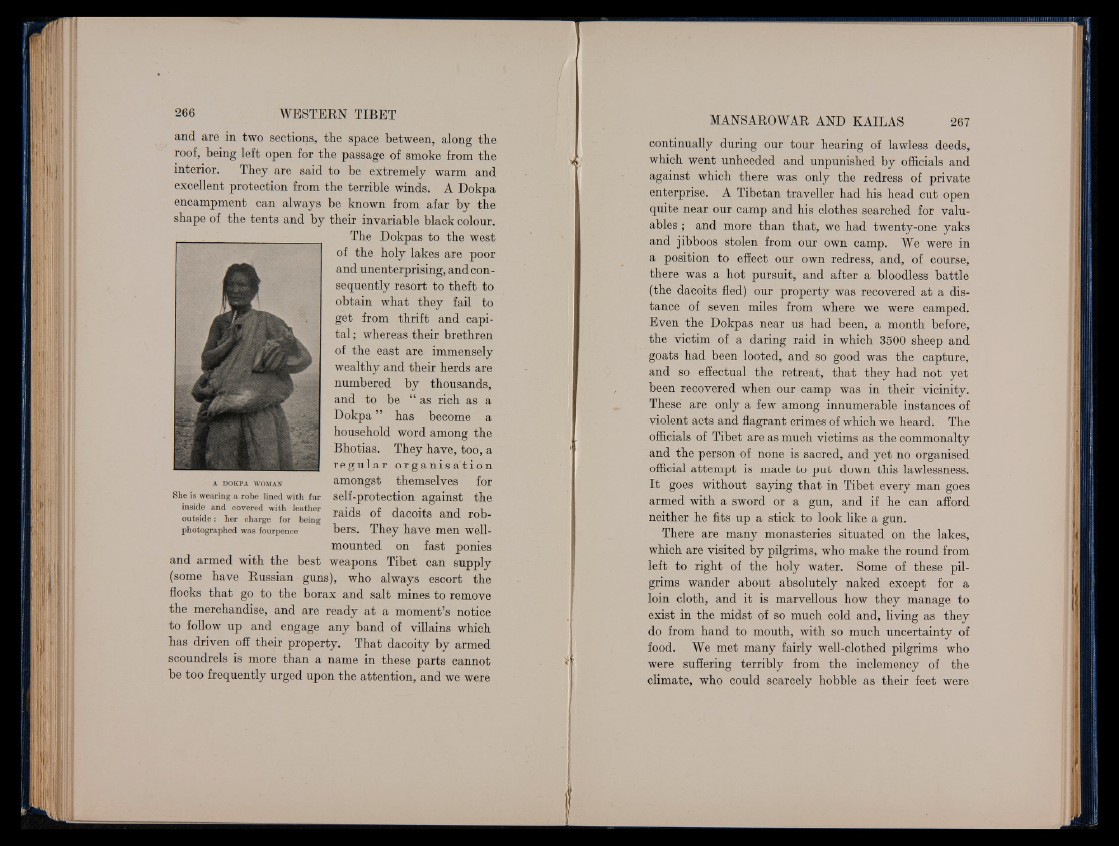
and are in two sections, the space between, along the
roof, being left open for the passage of smoke from the
interior. They are said to be extremely warm and
excellent protection from the terrible winds. A Dokpa
encampment can always be known from afar by the
shape of the tents and by their invariable black colour.
The Dokpas to the west
of the holy lakes are poor
and unenterprising, and consequently
resort to theft to
obtain what they fail to
get from thrift and capital
; whereas their brethren
of the east are immensely
wealthy and their herds are
numbered by thousands,
and to be “ as rich as a
Dokpa ” has become a
household word among the
Bhotias. They have, too, a
r e gul a r o r g a n i s a t i o n
A DOKPA WOMAN amongst themselves for
She ia wearing a robe lined with fur Self-protection against the
inside and covered with leather r i •, -i -t
outside: her eharge for being r a ld S ° f d aCOltS a n d r o b '
photographed was fourpenee bers. They have men wellmounted
on fast ponies
and armed with the best weapons Tibet can supply
(some have Russian guns), who always escort the
flocks that go to the borax and salt mines to remove
the merchandise, and are ready at a moment’s notice
to follow up and engage any band of villains which
has driven off their property. That dacoity by armed
scoundrels is more than a name in these parts cannot
be too frequently urged upon the attention, and we were
continually during our tour hearing of lawless deeds,
which went unheeded and unpunished by officials and
against which there was only the redress of private
enterprise. A Tibetan traveller had his head cut open
quite near our camp and his clothes searched for valuables
; and more than that, we had twenty-one yaks
and jibboos stolen from our own camp. We were in
a position to effect our own redress, and, of course,
there was a hot pursuit, and after a bloodless battle
(the dacoits fled) our property was recovered at a distance
of seven miles from where we were camped.
Even the Dokpas near us had been, a month before,
the victim of a daring raid in which 3500 sheep and
goats had been looted, and so good was the capture,
and so effectual the retreat, that they had not yet
been recovered when our camp was in their vicinity.
These are only a few among innumerable instances of
violent acts and flagrant crimes of which we heard. The
officials of Tibet are as much victims as the commonalty
and the person of none is sacred, and yet no organised
official attempt is made to put down this lawlessness.
I t goes without saying that in Tibet every man goes
armed with a sword or a gun, and if he can afford
neither he fits up a stick to look like a gun.
There are many monasteries situated on the lakes,
which are visited by pilgrims, who make the round from
left to right of the holy water. Some of these pilgrims
wander about absolutely naked except for a
loin cloth, and it is marvellous how they manage to
exist in the midst of so much cold and, living as they
do from hand to mouth, with so much uncertainty of
food. We met many fairly well-clothed pilgrims who
were suffering terribly from the inclemency of the
climate, who could scarcely hobble as their feet were